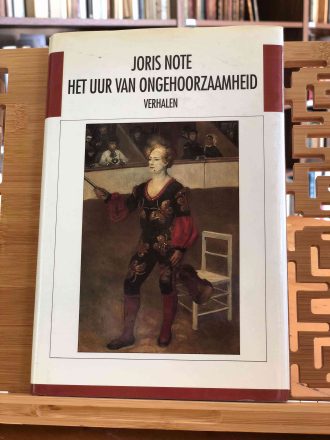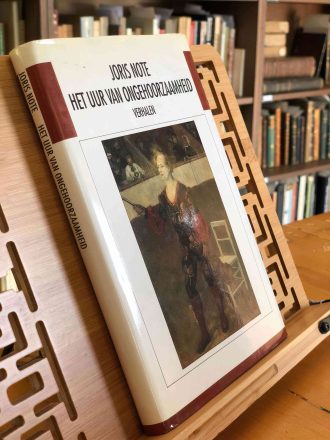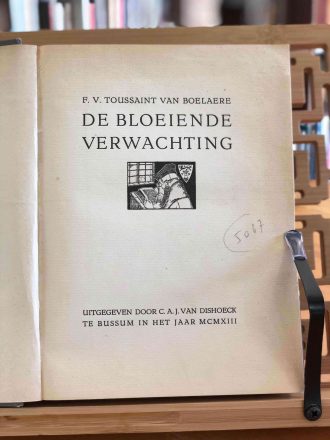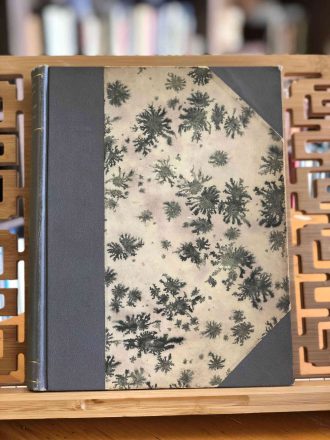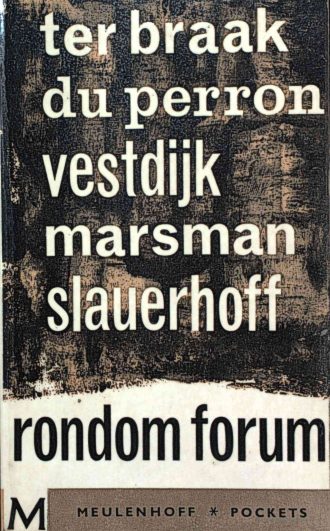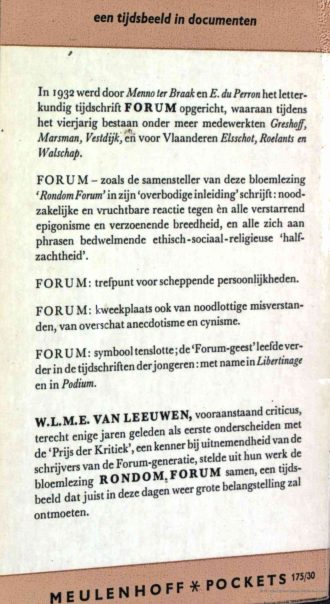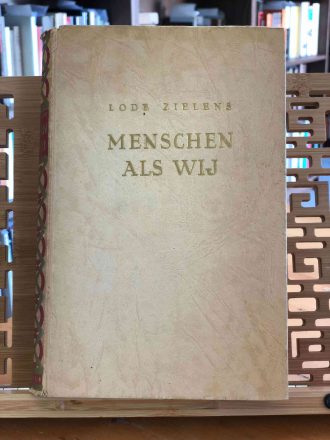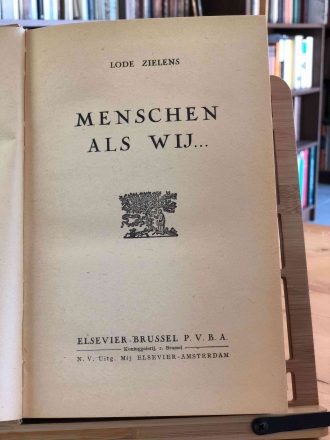Nederlands:
Herfst van Marcel Matthijs, gepubliceerd door Steenlandt in Kortrijk rond 1930, is een krachtige roman die de harde realiteit van het Vlaamse platteland en de stedelijke arbeidersklasse in het begin van de 20e eeuw blootlegt. Deze tweede editie, met 276 pagina’s en een formaat van 13,5 cm x 18,5 cm, is een diepgravende studie van sociaal realisme en persoonlijke worstelingen. Het boek is in uitstekende staat (Fine) met een zachte kaft en genaaide binding.
Matthijs, een schrijver bekend om zijn scherpe sociale commentaar en emotionele diepgang, verkent in Herfst de menselijke ervaringen van armoede, dronkenschap, bedrog, ziekte en dood. Het verhaal volgt een reeks personages die elk op hun manier worstelen met de zware omstandigheden van hun leven. In plaats van een pessimistische toon, hanteert Matthijs een zwartgallige kijk op de wereld, doordrenkt met fatalisme en een opstandige geest.
De roman begint met een sombere weergave van het plattelandsleven, waar de hoofdpersonen worden geconfronteerd met voortdurende economische en sociale druk. Hun armoede wordt voelbaar in de beschrijvingen van hun dagelijkse strijd om te overleven. Matthijs schildert een rauw en eerlijk portret van een gemeenschap waar de hoop schaarser is dan het dagelijkse brood, en waar mensen hun toevlucht zoeken in alcohol en bedrog om de uitzichtloosheid van hun bestaan te verdragen.
Naarmate het verhaal vordert, verdiept Matthijs zijn analyse door de psychologische en sociale drijfveren van zijn personages te verkennen. Een centrale figuur in het boek, Johan, worstelt met zijn eigen morele kompas terwijl hij geconfronteerd wordt met de verleidingen van dronkenschap en het bedrog van zijn vrienden en familie. Zijn innerlijke strijd weerspiegelt de bredere spanningen in de samenleving tussen persoonlijke overleving en collectieve verantwoordelijkheid.
Een bijzonder opvallend aspect van Herfst is Matthijs’ vermogen om de complexiteit van sociale onderdrukking te koppelen aan persoonlijke frustratie en woede. Hij schetst portretten van sterk gefrustreerde individuen die door hun omstandigheden worden gedreven tot anarchistische en vaak gewelddadige reacties. Deze karakters vertegenwoordigen een diepgeworteld ressentiment tegen de wereld en de machtsstructuren die hun levens bepalen.
Matthijs’ stijl in Herfst is direct en onverbloemd, met een scherp oog voor detail en een diep gevoel voor de tragiek van het gewone leven. Zijn gebruik van zwartgallige humor en sarcasme versterkt de emotionele impact van de verhalen en onderstreept de ironie van het menselijke bestaan in een wereld vol onrecht en misère. De kracht van zijn schrijven ligt in zijn vermogen om het persoonlijke en het politieke te verweven, waardoor hij niet alleen een sociaal commentaar levert maar ook een psychologisch inzicht biedt in de menselijke conditie.
Marcel Matthijs (1900-1954) was een Vlaams schrijver, bekend om zijn sociaal-realistische romans en scherpe literaire kritiek. Zijn werk reflecteert zijn betrokkenheid bij de sociale en politieke kwesties van zijn tijd, vooral met betrekking tot de arbeidersklasse en de sociale ongelijkheid in Vlaanderen. Tijdens de Eerste Wereldoorlog was hij actief in de activistische Groeningerwacht in Brugge, wat zijn latere engagement in het Vlaams-nationalisme en zijn collaboratie tijdens de Tweede Wereldoorlog mede beïnvloedde. Matthijs werd na de oorlog veroordeeld voor collaboratie en bracht tijd door in gevangenkampen. Ondanks zijn controversiële politieke keuzes blijft zijn literaire werk van blijvende waarde vanwege zijn realistische en vaak kritische blik op de sociale structuren van zijn tijd.
English:
Herfst (Autumn) by Marcel Matthijs, published by Steenlandt in Kortrijk around 1930, is a powerful novel that exposes the harsh realities of Flemish rural and urban working-class life in the early 20th century. This second edition, consisting of 276 pages and measuring 13.5 cm x 18.5 cm, is a profound study of social realism and personal struggles. The book is in fine condition with a softcover and sewn binding.
Matthijs, a writer known for his sharp social commentary and emotional depth, explores in Herfst the human experiences of poverty, alcoholism, deceit, illness, and death. The story follows a series of characters, each grappling with the harsh circumstances of their lives. Instead of adopting a pessimistic tone, Matthijs employs a grim outlook on the world, steeped in fatalism and a rebellious spirit.
The novel begins with a bleak depiction of rural life, where the protagonists face constant economic and social pressures. Their poverty is palpable in the descriptions of their daily struggles for survival. Matthijs paints a raw and honest portrait of a community where hope is scarcer than daily bread, and where people turn to alcohol and deceit to cope with the hopelessness of their existence.
As the story progresses, Matthijs deepens his analysis by exploring the psychological and social motivations of his characters. A central figure in the book, Johan, struggles with his moral compass as he confronts the temptations of alcoholism and the deceit of his friends and family. His inner turmoil mirrors the broader tensions in society between personal survival and collective responsibility.
A particularly striking aspect of Herfst is Matthijs’ ability to link the complexity of social oppression to personal frustration and anger. He portrays highly frustrated individuals driven by their circumstances to anarchistic and often violent reactions. These characters represent a deeply rooted resentment against the world and the power structures that dictate their lives.
Matthijs’ style in Herfst is direct and unflinching, with a keen eye for detail and a deep sense of the tragedy of ordinary life. His use of grim humor and sarcasm enhances the emotional impact of the stories and underscores the irony of human existence in a world full of injustice and misery. The strength of his writing lies in his ability to weave the personal and the political, providing not only social commentary but also psychological insight into the human condition.
Marcel Matthijs (1900-1954) was a Flemish writer known for his social-realist novels and sharp literary criticism. His work reflects his engagement with the social and political issues of his time, particularly concerning the working class and social inequality in Flanders. During World War I, he was active in the activist Groeningerwacht in Bruges, which influenced his later involvement in Flemish nationalism and his collaboration during World War II. Matthijs was convicted of collaboration after the war and spent time in prison camps. Despite his controversial political choices, his literary work remains of lasting value for its realistic and often critical view of the social structures of his time.








